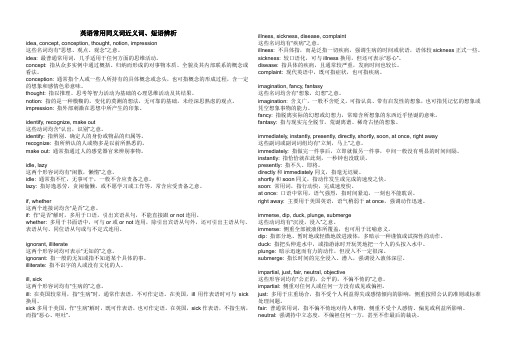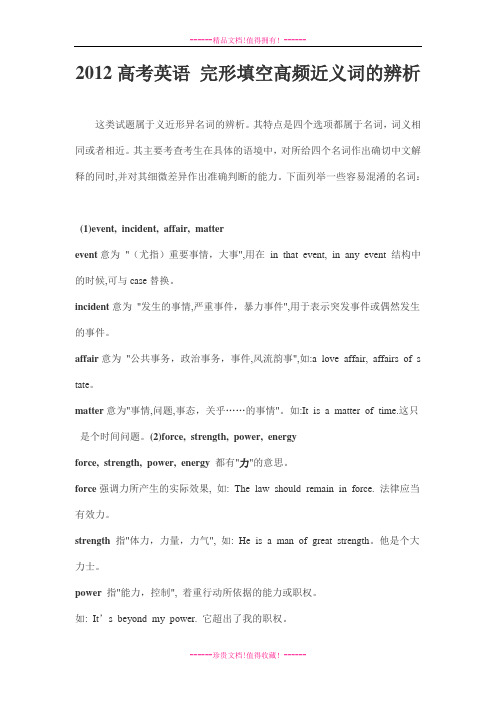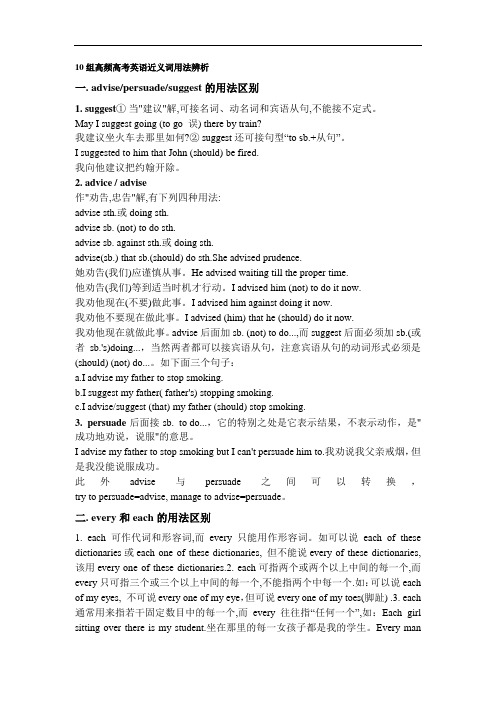高考英语近义词辨析
- 格式:doc
- 大小:49.50 KB
- 文档页数:12

高考英语常用同义词辨析1.face与confront这两个动词均含“面对”之意。
face 口语用词,含义广,侧重有勇气、决心或自信心去面对。
confront 书面用词,多指勇敢、冷静地面临某种问题、困难或任务等。
2.factory、 mill、plant与works这些名词都有“工厂”之意。
factory 最普通用词,可泛指任何制造产品的地方。
mill 原义指粮食加工厂。
现多指轻工业类的工厂。
plant 多指电力或机械制造方面的工厂。
works 多指钢铁等重工业方面的工厂,也指一些特定的厂。
3.fade与wither这两个动词都有“凋谢”之意。
fade 侧重指渐渐失去色彩和光泽。
wither 指因无活力而丧失生命力。
4.faithful、loyal、constant与true这些形容词均含有“忠实的”之意。
faithful 多指对人对事或对诺言、誓言的始终不渝,侧重在任何情况下都绝不改变。
loyal 一般指对祖国、领袖的忠诚或对事业、原则、誓言的忠实,不动摇。
constant 侧重指思想状态的稳定或信念的坚定,也指爱情或感情等的忠贞不渝。
true 侧重个人感情上的忠实和不动摇。
5.fair与market这两个名词均有“集市,市场”之意。
fair 一般指在乡村小镇定期举行的买卖牛羊或农产品等的集市。
现引申指国际性的博览会、交易会等。
market 指人们购买货品的地方,经常出售商品的市场。
6.fairly、 pretty、quite与rather这些程度副词都有“相当,颇”之意。
fairly 语意最弱,多用于褒义,表示适度地、尚可的意思。
不可与too或比较级连用。
pretty 用法与rather相似。
常用于非正式文体。
quite含义比fairly稍强,与不定冠词连用时,一般放在不定冠词之前。
rather语气比quite强,褒意贬意无可使用。
可与too和比较级连用。
7.fake, false这两个形容词都含有“假的”之意。

英语常用同义词近义词、短语辨析idea, concept, conception, thought, notion, impression这些名词均有“思想、观点、观念”之意。
idea: 最普通常用词,几乎适用于任何方面的思维活动。
concept: 指从众多实例中通过概括、归纳而形成的对事物本质、全貌及其内部联系的概念或看法。
conception: 通常指个人或一些人所持有的具体概念或念头,也可指概念的形成过程,含一定的想象和感情色彩意味。
thought: 指以推理、思考等智力活动为基础的心理思维活动及其结果。
notion: 指的是一种模糊的,变化的莫测的想法,无可靠的基础,未经深思熟虑的观点。
impression: 指外部刺激在思想中所产生的印象。
identify, recognize, make out这些动词均含“认出,识别”之意。
identify: 指辨别、确定人的身份或物品的归属等。
recognize: 指所辨认的人或物多是以前所熟悉的。
make out: 通常指通过人的感觉器官来辨别事物。
idle, lazy这两个形容词均有“闲散,懒惰”之意。
idle: 通常指不忙,无事可干,一般不含应责备之意。
lazy: 指好逸恶劳,贪闲偷懒,或不愿学习或工作等,常含应受责备之意。
if, whether这两个连接词均含“是否”之意。
if: 作“是否”解时,多用于口语,引出宾语从句,不能直接跟or not连用。
whether: 多用于书面语中,可与or或or not连用,除引出宾语从句外,还可引出主语从句、表语从句、同位语从句或与不定式连用。
ignorant, illiterate这两个形容词均可表示“无知的”之意。
ignorant: 指一般的无知或指不知道某个具体的事。
illiterate: 指不识字的人或没有文化的人。
ill, sick这两个形容词均有“生病的”之意。
ill: 在英国较常用,指“生病”时,通常作表语,不可作定语。

2012高考英语完形填空高频近义词的辨析这类试题属于义近形异名词的辨析。
其特点是四个选项都属于名词,词义相同或者相近。
其主要考查考生在具体的语境中,对所给四个名词作出确切中文解释的同时,并对其细微差异作出准确判断的能力。
下面列举一些容易混淆的名词:(1)event, incident, affair, matterevent意为"(尤指)重要事情,大事",用在in that event, in any event 结构中的时候,可与case替换。
incident意为"发生的事情,严重事件,暴力事件",用于表示突发事件或偶然发生的事件。
affair意为"公共事务,政治事务,事件,风流韵事",如:a love affair, affairs of s tate。
matter意为"事情,问题,事态,关乎……的事情"。
如:It is a matter of time.这只是个时间问题。
(2)force, strength, power, energyforce, strength, power, energy 都有"力"的意思。
force强调力所产生的实际效果, 如: The law should remain in force. 法律应当有效力。
strength指"体力,力量,力气", 如: He is a man of great strength。
他是个大力士。
power 指"能力,控制", 着重行动所依据的能力或职权。
如: It’s beyond my power. 它超出了我的职权。
energy原是物理学上的术语"能量", 用于人时则指"精力"。
如: He worked with great energy. 他精力充沛地工作。

10组高频高考英语近义词用法辨析一. advise/persuade/suggest的用法区别1. suggest①当"建议"解,可接名词、动名词和宾语从句,不能接不定式。
May I suggest going (to go 误) there by train?我建议坐火车去那里如何?② suggest还可接句型“to sb.+从句”。
I suggested to him that John (should) be fired.我向他建议把约翰开除。
2. advice / advise作"劝告,忠告"解,有下列四种用法:advise sth.或doing sth.advise sb. (not) to do sth.advise sb. against sth.或doing sth.advise(sb.) that sb.(should) do sth.She advised prudence.她劝告(我们)应谨慎从事。
He advised waiting till the proper time.他劝告(我们)等到适当时机才行动。
I advised him (not) to do it now.我劝他现在(不要)做此事。
I advised him against doing it now.我劝他不要现在做此事。
I advised (him) that he (should) do it now.我劝他现在就做此事。
advise后面加sb. (not) to do...,而suggest后面必须加sb.(或者sb.'s)doing...,当然两者都可以接宾语从句,注意宾语从句的动词形式必须是(should) (not) do...。
如下面三个句子:a.I advise my father to stop smoking.b.I suggest my father( father's) stopping smoking.c.I advise/suggest (that) my father (should) stop smoking.3. persuade后面接sb. to do...,它的特别之处是它表示结果,不表示动作,是"成功地劝说,说服"的意思。

--高考英语相近词汇辨析4.family, house, homehome家,包括住处和家人,house房子,住宅,family家庭成员. Myfamilyis a happy one.5. sound, voice,noiseﻫsound自然界各种各样的声音,voice人的嗓音,noise噪音I hate the loud noise outside.6.photo, picture, drawingphoto用照相机拍摄的照片,picture可指相片,图片,电影片,dra wing画的画Let's go and see agood picture.--11. course,subjectcourse课程(可包括多门科目),subject科目(具体的学科)asummer course12.custom, habitﻫcustom传统风俗,习俗,也可指生活习惯,后接to do,habit生活习惯,习惯成自然,后接of doing.I'vegot the habit of drinking a lot.17. officer,officialofficer部队的军官,official政府官员an armyofficer24. problem, questionﻫproblem常和困难连系,前面的动词常为think about, solve, raise,question常和疑问连系,多和ask, answer连用30. price, prizeﻫprice价格,prize奖,奖品,奖金win thefirst prizeThe price ishigh/low.35. by bus, on thebusﻫby bus表手段,方式,不用冠词,on thebus表范围They went there bybus.36. for amoment, for themomentfor a moment 片刻,一会儿,for the moment暂时,一时Thinking for amoment,he agreed.41. in a word,in wordsﻫin a word总之,一句话, inwor ds口头上In a word, you are right.42.inplace of, in theplace ofin placeof代替,in the placeof在…地方Anew building is built in the place of theold one.47. the doctorand teacher, the doctorand the teacherﻫthe doctor andteacher指一个人,既是医生又是老师,the doctor and the teacher两个人,一个医生和一个老师the doctor and teacher is61. who, whatﻫwho指姓名或关系,what指职业或地位What is your dad?He is a teacher.66. much more…than, manymore…thanﻫmuch more…than后接形容词或不可数名词,many more…than后接可数名词many morepeople, much morewater, muchmorebeautiful67. no, notriend nono=nota/any no friend=not a/any friwater=notany water73. fast, quicklyﻫfast侧重于指人或物体具有运动速度快的特点,quickly侧重指某事完成或发生的快run fast, answer the question quickly74. high, highlyhigh具体的高,highly抽象的高,高度的think highly of79. just, veryjust表强调时是副词,作状语,very表强调时是形容词,用作定语thevery man, just the man80. wide,broadwide侧重于一边到另一边的距离,broad侧重于幅面的宽广broadshoulders85. understanding, understandableunderstanding明白事理的,能体谅的,understandable 可理解的,能够懂的an understanding girl,an understandable mistake86. close, closelyﻫclose接近,靠近,closely紧紧地,紧密地closelyconnected,standclose91. able, capable ﻫable与不定式to do连用,capable与of连用He is capable of doing…92. almost, nearly二者均为"几乎,差不多" 和否定词连用用almost almost nobody93. late, latelylate迟,晚,lately最近,近来I haven't seen himlately.98. worth, worthy二者均为值得,worth后接doing,worthy后接to be done, ofbeingdoneIt is worthvisiting. = It's worthy to be visited.= It's worthy of being visited.103. instead,insteadofinstead是副词,放在句首或句末,instead of是介词短语,放在句中He didn'tsee afilm. Instead he watched TV. He watched TV insteadof seeing a film.104.toomuch, muchtooﻫtoo much 后接不可数名词,muchtoo后接形容词much too heavy105. beaboutto, begoingto, be todobeabout to表最近的将来,后面不接时间状语,be going to 侧重打算,想法,be to do侧重意志,计划,安排I'm to meet him.(含双方事先约好的意思)110.learn, studyﻫlearn学习,侧重学习的结果,study 学习,侧重学习的过程,研究study the problem111. want, hope, wishﻫwant打算,想要,want to do, wantsb. to do,hope希望(通常可以实现),hope todo/hope that…wish希望(通常不能实现)wish (sb.)to do, wish sb/sth. + n. I wishyou success.112. discover, invent, find outdiscover发现本来存在但不为人所知的东西,invent发明本来不存在的物体,find out发现,查明At last he found o ut the truth.113.answer, replyﻫanswer及物动词,reply不及物动词,后接toreply to theletter114. leave, leave forleave离开,leave for前往He left Beijing forShanghai.115.rob, stealrob抢劫rob sb. of sth.,steal偷steal sth.from sb.116.shoot,shoot atshoot射死,shootat瞄准,但不一定射中He shotthe bird and it died.123.meet, meetwithﻫmeet遇到,meet with体验到,遭遇到meet with an accident127. catch acold, have acoldﻫcatch acold不能和表示"一段时间"的状语连用,而have a cold可以She hashad a cold for a week.128. change for, change intochangefor调换成,change into变成Change the shirtfor a bigger one. Water changesintoice. 129. continue, lastﻫ二者均为持续,continue主动,被动均可,last只能用主动The warcontinued/lasted five years. The storyisto be continued.130.feed, raisefeed喂养,养活,饲养(togive food to), raise饲养,养育(cause togrow, bring upchildren)raise the family161. at,in (表地点)ﻫat小地点,in大地点arriveat a small village, arrive in Shanghai162. at work, in workatwork在工作,在上班,in work 有职业,有工作Bothmy parents are atwork. They are notat home.ncrease to, increase by163. incrincreaseto增长到…,increase by增长了…The n umber increased by 2,000 to 5,000.164. atease, with easeat ease舒适地,安逸地;with ease容易地,无困难地do itwith ease165. day after day, day by dayﻫday after day日复一日(无变化);day byday一天天地(有变化)Trees grow tal lerday by day.166. like, aslike相似关系,但并不等同,as同一关系,两者实为一体Don'ttreatme as a child.(In fact, I'm a child.)167. after, in (表时间)after接时间点,in接时间段after 7:00, in five minute s168. between, amongbetween两者之间,三者或三者以上两两之间, among三者或三者以上之间ﻫSwitzerland lies between France, Germany, Australia and Italy.表位置)169. after, behind (表位置after强调次序的先后,behind强调物体静态位置的前后Therearemanytrees behind the house.170. since, for(完成时间状语)since接点时间或一句话,for接一段时间for three years, since3:00171. onthe corner,in the corner, at the cornerﻫon the corner物体表面的角上,in thecorner物体内部的角落里,at the corner物体外部的角落上(拐角处)on the corner of thetable176. in the air,on the air, in theskyﻫin the air正在酝酿中,on the air播送,广播,in the sky在天空中H is show is on the air at 6:00 tonight.177.in the field, on thefieldin the field在野外,on the field在战场上Helosthis lifeon the field.182.on theway, inthe wayﻫonthe way在前往…的路上,in the way挡路The chair is in the way.183.above, on,overabove在上面,不接触,on在上面,接触,over在正上方fly over thehill187. and,orand并且,or或者,否则,常用于否定句中I don't likeapples or bananas.Hurry up andyou'llcatch the bus.Hurry upor you'll miss the bus.188. because, since, as,forﻫ原因由强到弱为:because, since/as,for.在句中的位置如下:1)…because…2) Since/as…, …3) …, for…Since Iwas ill, I didn'tgo.192. such…as, such…thatsuch…as像…样的,such…that如此…以至于He is not such a fool as he lookslike. Heis such a good student that allthe teachers likehim.193.because, becauseofbecause连词,连接两句话,because of介词短语,后接词或短语He didn't goto school because of his illness.197. All right. That's allright.That's right.ﻫAll right. That's allright. 当好吧解时,可以替换;当不客气,没关系解时只能用That's allright.That's right.那是对的---Sorry. ---That's all right.198. such…that, so…thatﻫ当如此…以至于解时,such…that修饰名词,so…that修饰形容词或副词,但名词前面如果有many, much, little, few修饰用so…that,不用such thatﻫso manypeoplethat…sucha lovelyboy=so lovelya boy199. so + be (have, can,do)+主语,neither (nor)+be (have,can, do)+ 主语也一样,肯定用so…否定用neither(nor) ---I can'tplay tennis. ---Nor canI.200. Shall I…? Will you…?Shall I…? 征求对方意见或向对方请示,意为我能…吗? Willyou…? 请求或建议对方做某事,意为你愿意…吗?Will youhelp me? Yes, I will.。

高考(考研)英语同近义词超强辨析1.indeed,really,truly,actually·这些副词均有“确实地、真正地”之意。
·indeed一般用于肯定或证实对方所说的话,多承接前言,也用来加强或肯定自己说话的语气。
·really主要用于强调与事实或现实不相违背,也可表示不快、惊奇或某种含蓄的怀疑。
·truly强调客观存在的真实性,没有任何虚假。
·actually侧重于实际的事,而不是凭空想象或推测的事。
2.same,identical,very,equal,equivalent·这些形容词均含“相同的”之意。
·same可指相同的人或物,也可指在质量、外表或意义等方面相同,但实际上有差别的事物。
·identical着重指人或物等在每细节上都完全相同。
·very侧重指完全同一,没有区别。
·equal多指在价值等方面相当而不相同的事物。
·equivalent主要指有同样价值、效力或意义的两种不同的事物。
3.too,very·这两个副词均可表示“大,很”之意。
·too指超过了承受能力或程度,即程度加到了不适当的地步。
·very用于加强程度,可修饰褒义词和贬义词。
4.very,right,just·三者都含有“正好;就是”之意。
·very是形容词,用来修饰名词,位于the, this,my等限定词后。
·right作副词,用来修饰谓语(常为动词be)或作状语的介词短语等,须放在the, this my 等限定词之前。
·just作副词与right类似。
5 canal, branch, brook, creek, river, stream, torrent·这组词的共同意思是“流水的通道”。
其区别是:· 1.除canal指人工开挖的河流或渠道外,其余各词均指自然形成的水道。
高中英语中的近义词辨析与选择在高中英语的学习中,近义词的辨析与选择一直是一个重要且具有挑战性的部分。
正确理解和运用近义词,不仅能够提高我们的语言表达能力,还能在阅读理解、写作等方面避免误解和错误。
首先,让我们来谈谈“accept”和“receive”这对近义词。
“Receive”侧重于“收到”这个动作,强调客观上的接收,比如“ I received a letter yesterday ”(我昨天收到了一封信),这里只是说收到了信,不管对信的内容或态度如何。
而“Accept”则更强调主观上的接受,带有认可、同意的意思,例如“ I accepted his invitation ”(我接受了他的邀请),表示不仅收到了邀请,还愿意去。
再看“advice”和“suggestion”。
“Advice”是不可数名词,常指具有权威性、全局性的“劝告、建议”,比如“You should follow your parents' advice ”(你应该听从你父母的建议)。
“Suggestion”是可数名词,侧重于针对某一具体情况给出的“提议、建议”,“I have some suggestions for your travel plan ”(对于你的旅行计划我有一些建议)。
“Alone”和“lonely”也是容易混淆的一组词。
“Alone”表示“独自的、单独的”,侧重于指客观上的独自一人的状态,“He lives alone ”(他独自居住)。
“Lonely”则更侧重于内心感受,指“孤独的、寂寞的”,“She feels lonely in the new city ”(她在新城市感到孤独)。
接着说“cost”,“spend”,“take”和“pay”这四个表示“花费”的词。
“Cost”的主语通常是物,“The book costs 20 yuan ”(这本书花费 20 元)。
“Spend”的主语是人,常用句型为“spendon sth”或者“spend(in) doing sth”,“He spent two hours on his homework ”(他花了两个小时做作业)。
高考英语常用同近义词词汇辨析2◆ catch sb.doing sth;be (get) caught in sth.◇ catch sb.doing sth.作“碰(遇)上某人正在做某事”解。
例如:The policeman caught two men fighting in the street.警察碰见两个人在街上打架。
The man was caught stealing the apples.那人偷苹果时,被当场发现。
◇ be (get) caught in sth.“遇上……而受阻”之意。
例如:I got caught in the traffic.我因交通堵塞而受阻。
I was caught in a storm on my way to school.我在去学校的路上遇到了暴雨。
◆ care about; care for; care; care to ◇ care about“关心;计较;在乎”,指由于某事重要,或因责任所在而关心计较,一般用于否定句。
如:He doesn't care about his clothes.他不讲究衣着。
I don't care about going there.去不去那里,我无所谓。
◇ care for“关心;照料;喜欢;愿意”。
作“关心;照料”讲,一般用于肯定句或疑问句。
如:Who will care for your children when you are away﹖你离开期间谁照顾你的孩子?How the Party cares for us! 党是多么关心我们啊!Would you care for a walk? 你愿意去散步吗?He cares more for fine new clothes than for anything else.他喜爱漂亮的新衣胜于其他的一切。
◇ care还可作及物动词,但其后通常接从句。
高考英语常用同近义词词汇辨析3◆ fall off;fall down;fall onto;fall into◇ fall off用作及物动词,表示“从……上落下,掉下,摔下”。
如:The house moved and a few pictures fell off the wall,but that was all.房子动了动,几幅画从墙上掉了下来,就这些。
He had fallen off a ladder and hurt his leg.他从梯子上摔下来,伤了腿。
有时,它也可用作不及物动词,表示“落下,掉下,脱落”;也可表示“减少,越来越少”。
如:I watched all the glasses that were on the table fall off.我看着桌子上的杯子全掉下来。
His supporters were falling off.支持他的人越来越少了。
◇ fall down通常用作不及物动词,表示“(人)跌倒,摔倒,绊倒”或“(房屋等)倒塌”。
如:The old lady fell down in the street and broke her leg.那老太太在街上跌倒了,摔坏了腿。
◇ fall onto意为“掉到……上”,其中onto为介词,也可用to。
如:The books fell off the desk onto/to the ground.书从桌上掉到了地上。
◇ fall into意为“掉到……里陷入(困难)”等,into是介词。
如:fall into the river 掉进河里◆ fasten; tie◇ fasten意为“栓住、捆牢、扎紧”,常用作及物动词(用于fasten ...to...结构时,可以与tie互换,但语气上fasten比tie重);也可用作不及物动词,意为“(把目光、思想、注意力)集中于……”。
◇ tie意为“系、栓、扎”,常用作及物动词,后接其同源宾语tie, knot等;用作不及物动词时,意为“打领带、打领结”。
高考英语常用同义词详细辨析+例句1wage / pay / salary:以上各词均指收入、工资、薪水。
e.g.a weekly wage of $200 周薪200美元Her job is hard work, but the pay is good.她工作虽辛苦,但薪水不低。
His annual salary is just under $48,000.他的年薪将近48,000美元。
2look / glance / stare / glare / gaze / glimpse:以上各词均表示看的意思。
e.g.Here, have a look at this.来,看一看这个。
She stole a glance at her watch.她偷偷看了看表。
She gave the officer a blank stare and shrugged her shoulders.她面无表情地盯着那个军官,耸了耸肩。
She fixed her questioner with a hostile glare.她带着敌意瞪着向她提问的人。
She felt embarrassed under his steady gaze.她在他凝视的目光下感到很尴尬。
He caught a glimpse of her in the crowd.他在人群里一眼瞥见了她。
3recommend / advise / advocate / urge:以上各词均含劝告、建议之义。
e.g.We’d recommend you to book your flight early.我们建议你早点儿预订航班。
I’d advise you not to tell him.我劝你别告诉他。
The group does not advocate the use of violence.该团体不支持使用暴力。
The situation is dangerous and the UN is urging caution.局势岌岌可危,联合国力主谨慎行事。
高考近义词辨析 1. clothes, cloth, clothing clothes统指各种衣服,谓语动词永远是复数, cloth指布,为不可数名词 clothing 服装的总称,指一件衣服用a piece of, an article of 2. incident, accident incident指小事件, accident指不幸的事故He was killed in the accident. 3. amount, number amount后接不可数名词, number后接可数名词 a number of students 4. family, house, home home 家,包括住处和家人,house房子,住宅,family家庭成员. My family is a happy one. 5. sound, voice, noise sound自然界各种各样的声音,voice人的嗓音,noise噪音I hate the loud noise outside. 6. photo, picture, drawing photo用照相机拍摄的照片,picture可指相片,图片,电影片,drawing画的画 Let's go and see a good picture. 7. vocabulary, word vocabulary词汇,一个人拥有的单词量,word具体的单词He has a large vocabulary. 8. population, people population人口,人数,people具体的人 China has a large population. 9. weather, climate weather一天内具体的天气状况,climate长期的气候状况 The climate here is not good for you. 10. road, street, path, way road具体的公路,马路,street街道,path小路,小径,way道路,途径 take this road; in the street, show me the way to the museum. 11. course, subject course课程(可包括多门科目),subject科目(具体的学科)a summer course 12. custom, habit custom传统风俗,习俗,也可指生活习惯,后接to do, habit生活习惯,习惯成自然,后接of doing. I've got the habit of drinking a lot. 13. cause, reason cause 指造成某一事实或现象的直接原因,后接of sth./doing sth,reason用来解释某种现象或结果的理由,后接for sth./doing sth. the reason for being late 14. exercise, exercises, practice exercise运动,锻炼(不可数),exercises练习(可数),practice(反复做的)练习 Practice makes perfect. 15. class, lesson 作"课"解时,两者可以替换.指课文用lesson. 指班级或全体学生用class. lesson 6; class 5 16. speech, talk, lecture speech指在公共场所所做的经过准备的较正式的演说,talk日常生活中的一般的谈话,讲话,lecture学术性的演讲,讲课 a series of lecture on… 17. officer, official officer部队的军官,official政府官员 an army officer 18. work, job 二者均指工作。work不可数,job可数 a good job 19. couple, pair couple主要指人或动物,pair多指由两部分组成的东西 a pair of trousers 20. country, nation, state, land country侧重指版图,疆域,nation指人民,国民,民族,state侧重指政府,政体,land国土,国家 The whole nation was sad at the news. 21. cook, cooker cook厨师,cooker厨具 He is a good cook. 22. damage, damages damage不可数名词, 损害,损失; damages复数形式, 赔偿金 $900 damages 23. police, policeman police警察的总称,后接复数谓语动词,policeman 指某个具体的警察 The police are questioning everyone in the house. 24. problem, question problem常和困难连系,前面的动词常为think about, solve, raise,question常和疑问连系,多和ask, answer连用 25. man, a man man人类,a man一个男人 Man will conquer nature. 26. chick, chicken 二者均可指小鸡,chicken还可以当鸡肉 The chicken is delicious. 27. telegram, telegraph 当电报解时,telegram指具体的,telegraph指抽象的 a telegram, by telegraph 28. trip, journey, travel, voyage travel是最常用的,trip指短期的旅途,journey指稍长的旅途,voyage指海上航行a three-day trip 29. sport, game sport多指户外的游戏或娱乐活动,如打球,游泳,打猎,赛马等;game指决定胜负的游戏,通常有一套规则 His favorite sport is swimming. 30. price, prize price价格,prize奖,奖品,奖金 win the first prize The price is high/low. 31. a number of, the number of a number of许多,谓语动词用复数。the number of…的数目,谓语动词用单数。The number of students is increasing. 32. in front of, in the front of in front of范围外的前面,in the front of范围内的前面 In the front of the room sits a boy. 33. of the day, of a day of the day每一天的,当时的,当代的, of a day暂时的,不长久的 a famous scientist of the day 34. three of us, the three of us three of us我们(不止三个)中的三个,the three of us我们三个(就三个人)The three of us---Tom, Jack and I went to the cinema. 35. by bus, on the bus by bus表手段,方式,不用冠词,on the bus表范围 They went there by bus. 36. for a moment, for the moment for a moment 片刻,一会儿,for the moment暂时,一时 Thinking for a moment, he agreed. 37. next year, the next year next year将来时间状语,the next year过去将来时间状语 He said he would go abroad the next year. 38. more than a year, more than one year more than a year一年多,more than one year超过一年(两年或三年等) 39. take advice, take the(one's) advice take advice征求意见,take the advice接受忠告 He refused to take the advice and failed again. 40. take air, take the air take air传播,走漏,take the air到户外去,散步 We take the air every day. 41. in a word, in words in a word总之,一句话, in words口头上 In a word, you are right. 42. in place of, in the place of in place of代替,in the place of在…地方 A new building is built in the place of the old one. 43. in secret, in the secret in secret秘密地,暗自地,偷偷地,一般用作状语;in the secret知道内情,知道秘密, 一般用作表语 My mother was in the secret from the beginning. 44. a girl, one girl a girl可泛指所有女孩, one girl一个女孩 Can one girl carry such a big box? 45. take a chair, take the chair take a chair相当于sit down坐下,take the chair开始开会 46. go to sea, by sea, by the sea go to sea当海员,出航,by sea乘船,由海路, by the sea在海边 go by sea 47. the doctor and teacher, the doctor and the teacher the doctor and teacher指一个人,既是医生又是老师,the doctor and the teacher两个人,一个医生和一个老师 the doctor and teacher is 48. in office, in the office in office在职的,in the office在办公室里 He is in office, not out of office. 49. in bed, on the bed in bed卧在床上,on the bed在床上 The book is on the bed. He is ill in bed. 50. in charge of, in the charge of in charge of管理,负责照料, in the charge of由……照料 He is in charge of the matter. The matter is in the charge of her. 51. in class, in the class in class在课上,in the class在班级里 He is the best student in the class.